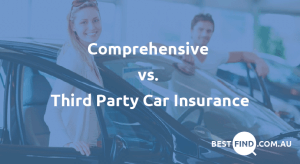What You Should Know: Comprehensive vs. Third Party Car Insurance.
For a first-time buyer, deciding which car insurance to purchase can be more complicated than choosing the car itself. There are so many terms that are thrown around Comprehensive Car Insurance, Third-Party Insurance, Fire and Theft Insurance, Compulsory Insurance…Honestly, it can feel a bit like your insurance might need its own insurance sometimes!
It’s one of those things that isn’t taught at school but you wish would have been because, like doing taxes, cooking and learning how to make a doctor’s appointment, it’s important but unfortunately, it isn’t something many of us understand.
Insurance is important and it protects you from being left up a creek without a paddle if your car gets damaged, stolen or needs serious repairs. It is also easy to think you might not need car insurance if you’re a careful driver but, the statistics tell us otherwise. Road crashes are very common all across Australia and you’d never drive without a seat belt or airbags, so, why would you drive without insurance?
So, for something so important it stands to reason that we should all get a little more education on the subject.
What is Comprehensive Car Insurance?
Comprehensive Car Insurance lives up to the name. If you are looking for peace of mind then a Comprehensive Insurance policy will give you reassurance in spades. These policies are known for giving you extensive coverage in a wide range of situations from accidents and collisions (even if you’re at fault). They cover towing and emergency repairs and often even offer replacement cars if your vehicle is a write-off. They even provide cover for damage done in situations where you’re not behind the wheel, for example, theft, fire, vandalism, malicious damage or weather-related damage. Some policies even stretch as far as to cover your car’s contents if it’s stolen or damaged.
If you invest in comprehensive car insurance, your insurance policy will also have your back should your vehicle cause damage to someone else’s vehicle or property. So, if an accident that you’re in causes consequent damage to another person’s vehicle, belongings or private property then your insurance will pay to repair or replace the damaged property belonging to someone else. Comprehensive Car Insurance policies are highly competitive meaning you’re sure to find a fairly priced policy that will suit your needs. If you’re still not sure how this relates to your recent car purchase, a good rule of thumb to follow is if you’ve bought a brand-new car or your car is in relatively good condition then comprehensive car insurance would likely be your best option. To learn more about the specifics of policies, head here to check out NRMA comprehensive car insurance.
What is Third-Party Car Insurance?
Third-Party Car Insurance, sometimes called Third-Party Property Damage Insurance, offers a lower level of coverage. At its most basic level, this sort of coverage covers damage to other people’s vehicles and property but, if your car is damaged in the same event, and you are found to be at fault, your repairs likely won’t be covered (although specific plans vary from insurer to insurer).
Who would this type of insurance be suited to? If you have a relatively low-value car meaning the value of the car is low enough that you wouldn’t bother to repair it, or if you know you wouldn’t be left struggling to pay for repairs out of your own pocket then this level of insurance may be sufficient for you. If this is the case, you’d still need to be insured so that you are not left financially exposed by having to pay for the damage your car might do to a more valuable vehicle or piece of private property.
An important thing to remember is that Third- Party Car Insurance is not the same thing as Compulsory Third Party (CTP) Insurance or your Green Slip. In Australia, CTP Insurance is mandatory and you’ll need to provide proof of it before you can register your car. In most states, your CTP Insurance is rolled into your registration, but in NSW you need to purchase it separately. This insurance covers the liability for anyone behind the wheel in the case they injure other individuals in a motor accident but won’t cover any damage to property.
So, what does this mean at the end of the day?
The sort of car insurance you should buy is dependent on the amount of coverage you’ll need. Comprehensive Car Insurance offers you near-total peace of mind, covering you extensively in a wide range of situations whether or not you’re at fault and whether or not you’re behind the wheel at the time. This is the best choice if you’re driving a new car that is in relatively good condition. If the value of your car is relatively low, Third Party Car Insurance may be enough for you. If you’re interested in a further comparison between the two policies, check out this Australian government comparison resource.
Dennis Graham is a seasoned finance professional working within Banking, Lending and Novated Leasing. An expert finance writer, Dennis combines industry insights with clear communication to deliver insights into financial products.
Latest posts

What You Should Know: Comprehensive vs. Third Party Car Insurance.
28.07.2020

What You Need to get a Mortgage in Australia
11.04.2019

What is a term deposit and how does it work?
04.06.2018
